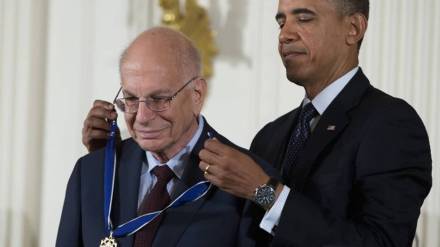By Amarendu Nandy
Rare are the thinkers whose ideas fundamentally reshape academic disciplines. Rarer still are those whose influence permeates the functioning of markets, corporations, and economies. Daniel Kahneman undeniably belonged to this exclusive category. With his passing on March 27, aged 90, the world lost one of the most influential thinkers in the modern history of economics and psychology.
Born on March 5, 1934, in Tel Aviv, Kahneman’s childhood was marked by tragedy and hardship as his family endured the Nazi occupation of France. These formative years bore witness to grotesque inhumanities that, as Kahneman recounted in his 2002 Nobel Prize biographical, sowed the seeds of his lifelong quest “to get an insight into the peculiarities of human cognitive processes”. His first-hand acquaintance with such complexities of human psychology in early life cultivated a deep-seated humility regarding the boundaries of rationality, a sentiment that served as a cornerstone for his remarkably enlightening body of work.
Kahneman’s distressing wartime experiences steered him towards the study of psychology. After earning his undergraduate degree from the Hebrew University of Jerusalem, he obtained his PhD in psychology in 1961 from University of California, Berkeley. Subsequently, his academic journey took him to Princeton University, where he made enduring contributions to the intersecting realms of psychology and economics.
His impact on economics cannot be overstated. Perhaps his most consequential contribution was the systematic demolition of homo economicus—the mythical, perfectly rational economic agent driven solely by self-interest. His pioneering research challenged the longstanding assumptions about human rationality and altered the very foundations upon which traditional economic models were built.
The findings attracted vociferous criticism and scepticism from mainstream economists. How could humans systematically violate the axioms of rationality that undergirded elegant models and precisely quantified theories? It required much scientific rigour and empirical proof to persuade the field, which he supplied through hundreds of meticulous experiments over decades.
Through his seminal collaboration with Amos Tversky at the Hebrew University, Kahneman revealed how flawed human cognition could be. Their pioneering research exposed how ostensibly rational individuals systematically violate the assumptions of utility maximisation due to cognitive biases, heuristic shortcuts, and deeply rooted psychological forces. They demonstrated the powerful impact of framing effects—how subtle changes in wording describing mathematically identical scenarios produced drastically divergent choices, defying the tenets of rational economic agency.
Central to Kahneman and Tversky’s contribution was the concept of prospect theory, which upended classical economic notions of utility maximisation. Their research showed how individuals evaluated potential losses differently than gains, departing from expected utility maximisation, influenced by psychological factors such as framing effects and loss aversion. These fundamental insights not only earned Kahneman the Nobel Prize in economics later in 2002, but also ushered in a new era of interdisciplinary inquiry. It laid the groundwork for the influential field of behavioural economics and nudge theory that continues to redefine our understanding of markets, policies, and human behaviour.
Today, Kahneman’s contributions reverberate across boardrooms and trading floors, where his insights into decision framing, loss aversion, and the malleability of risk tolerance continue to guide strategic planning and investment decisions, fostering a culture of introspection and evidence-based decision-making. In the domain of public policy, his advocacy for behavioural insights continues to influence approaches to healthcare, finance, and sustainability. His work with governments and international organisations underscored the profound implications of psychological biases on societal welfare, paving the way for more compassionate and effective governance.
In his later years, Kahneman continued to explore the intricacies of human behaviour, delving into the nuances of experienced versus remembered well-being. His research on the peak-end rule shed light on the peculiarities of human memory, challenging our assumptions about what truly shapes our happiness and satisfaction. As he succinctly put it, “We do not choose between experiences. We choose between memories of experiences. Even when we think about the future, we do not think of our future normally, (as in) the experiences. We think of our future as anticipated memories.”
Despite his achievements, Kahneman remained humble and introspective. He was a relentless sceptic, constantly questioning his own assumptions and interrogating the limits of human cognition. His best-selling book, Thinking, Fast and Slow (2011), captured the essence of his research in accessible prose, inviting readers into the inner sanctum of the mind and challenging them to rethink their most fundamental assumptions. With wit and clarity, Kahneman illuminated the hidden forces that shape our choices.
Kahneman’s transcendent legacy is an infinitely richer yet radically humbler paradigm for understanding human rationality, judgement, and choice. It is a daunting inheritance, centred on mapping the nuances of real human behaviour rather than tidy optimisation models.
His passing leaves an immense void and an equally immense and indelible legacy that will keep influencing thinkers across every field where human decisions hold sway—a testament to the impact of his groundbreaking contributions.
Amarendu Nandy, The author teaches economics at IIM-Ranchi. Views are personal
